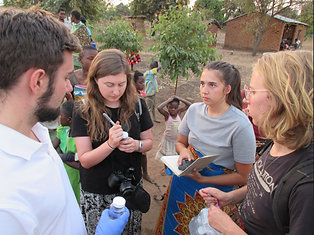Community Service & Public Service
Key difference: Community service involves the dedication of one’s time and energy to a cause in a volunteer capacity, while public service generally refers to the care of citizens as carried out by the government or other agencies (for example, nonprofits).
Community service and public service are closely related. Both were integral to my experience as a Community Engagement Scholar. The timeline below reflects both of these types of service. Put together, my short-term and long-term community engagement efforts totaled well over 1,000 hours while I was an undergraduate at the University of Delaware.
Service Timeline

When: August, 2018
Where: Seaford, Delaware
What: Habitat for Humanity Build
Total hours: 72


When: December, 2018
Where: Newark, Delaware
What: Decorating Assisted Living Facility
Total hours: 5
When: January, 2019
Where: Valencia, Spain
What: After School Programming
Total hours: 5


When: April, 2019
Where: Dover, Delaware
What: Middle School Youth in Government Conference
Total hours: 15
When: July, 2019
Where: Wilmington, Delaware
What: Hanover Community Dinner
Total hours: 3


When: August, 2019
Where: Sakata Region, Malawi
What: Engineers Without Borders Assessment Trip (as well as pre-/post-trip activities)
Total hours: 500+
When: Fall 2019-Summer 2020
Where: Wilmington, Delaware
What: Volunteer Intern at the Delaware Center for Justice
Total hours: 300+ hours


When: June-August 2020
Where: Washington, D.C. (remote)
What: Congressional Intern for U.S. Senator Christopher Coons
Total hours: 480
When: October 2021
Where: New Castle, Delaware
What: After School Programming at the Hope Center
Total hours: 3
Service Reflection
As a volunteer intern with the School Offense Diversion Program at the Delaware Center for Justice (DCJ), I worked with middle and high school students who had been arrested as a result of their school discipline experience. The expectation was that at the completion of the program the students would get their records expunged. This internship brought together my two policy passion areas, youth development and justice, and allowed me to use the skills that I have gleaned from studying Public Policy at the University of Delaware to advocate for positive change. One of my biggest projects involved creating a policy brief for the DCJ that incorporated the students’ voices and made concrete recommendations centered around implementing restorative justice practices in Delaware’s schools. To create a framework for this project, I posed the following question to myself at the beginning of my internship: What is the definition of justice?
I love difficult problems and questions that are hard to answer, like this one. Perhaps this is why I joined the University of Delaware’s Chapter of Engineers Without Borders (EWB-UD). When I joined, I was the only student with a non-engineering major. Despite this, I was not intimidated to take on challenges that were outside of my comfort zone or to work on projects that were not within my field of study. I had the opportunity to travel with EWB-UD to Malawi to work in partnership with two communities, Liti and Nkagula, on clean water projects. I volunteered to lead the development of surveys which were ultimately used in the field. I worked with other students to compile a list of questions and to refine the tools. When in Malawi I was able to administer the surveys with the help of interpreters. Later, I am worked to evaluate the qualitative and quantitative data that were collected and lead a group of EWB-UD team members to do so. I found the interdisciplinary nature of this work to be incredibly valuable. One thing that I noticed about the problems that EWB-UD is addressing, and about problems in engineering in general, is that they have an answer. Our community partners in Malawi had a specific need, water, and we were addressing that need with mathematical and scientific solutions that culminated in the building of a well with a hand pump. However, the part of me that studies Public Policy cannot ignore the multitude of factors and systemic issues that impact access to clean water. Furthermore, I cannot ignore that no one person, including myself, seems to be able to fully grasp all of the components that impact this larger problem. It is greater than a single community’s specific need for water, which can be addressed with the implementation of a well.
From my service with EWB-UD and DCJ, I am able to recognize that I do not know how to solve every problem. It is difficult for me to explain, in a way that is truly comprehensive of all factors, why some students are getting arrested in school and others are not. What is justice? I do not know and on my own will never know the answers to questions like this. But I do understand the need to incorporate a multitude of diverse voices in the problem-solving process. This is exactly the sort of thing that we studied in my Community Engagement Scholars introductory course and is something that can be applied to all of my community-engaged efforts going forward.
I believe that the Master of Public Administration (4+1) Program that I am pursuing at the University of Delaware will help me to learn how to incorporate the voices of others and process problems effectively. Already, in the course Performance Management and Program Evaluation (UAPP684), I have learned about the strategies used by policy makers, nonprofits, and other individuals in the public sector to evaluate in a way that is culturally responsive and capitalizes on the wisdom of people who are affected by a particular problem.
Furthermore, earning my master’s in public administration will help me to grow in my understanding of the intersection between policy, programs, and research. I believe that this degree will enable me to develop my leadership and management skills and will increase my knowledge about the public sector and nonprofits in particular. I hope to one day work with an organization that connects youth development and justice, much like the Delaware Center for Justice.